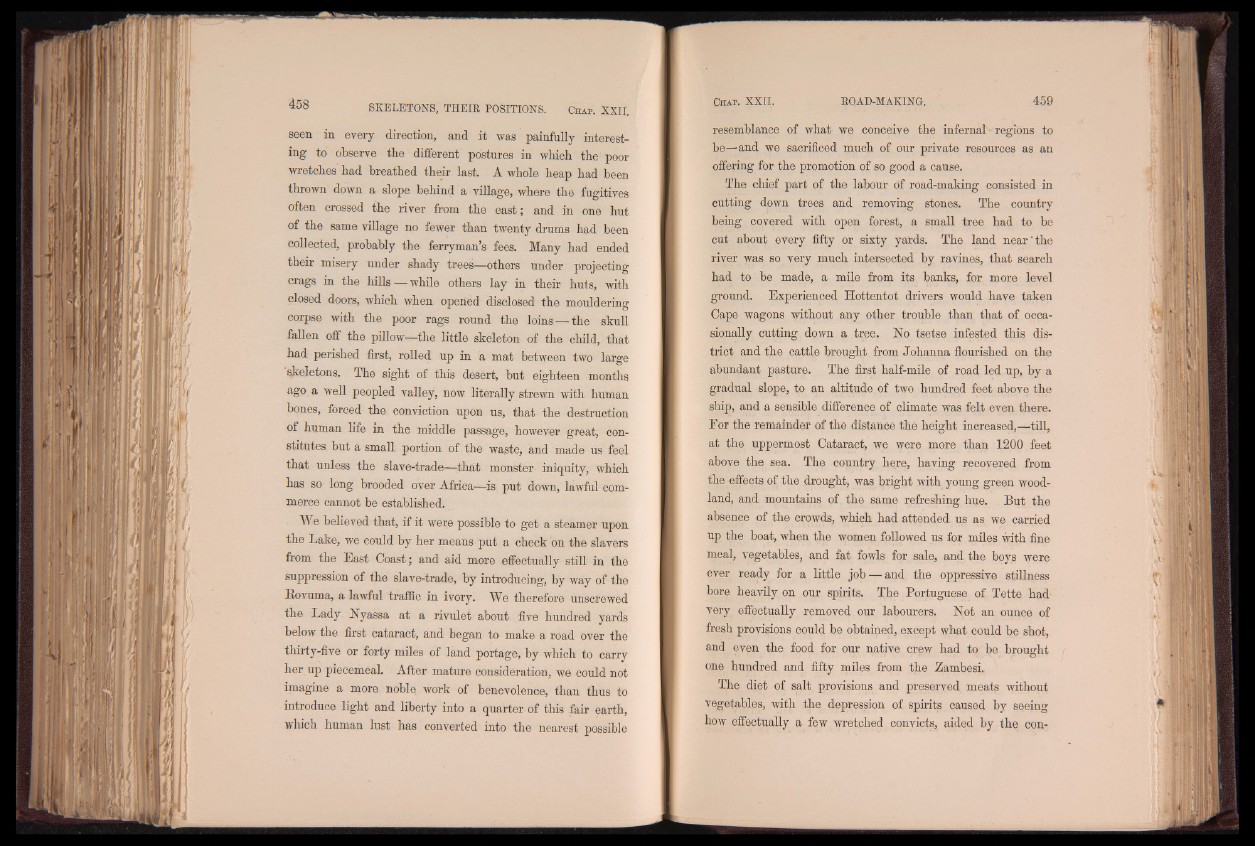
seen in every direction, and it was painfully interesting
to observe the different postures in which the poor
wretches had breathed their last. A whole heap had been
thrown down a slope behind a village, where the fugitives
often crossed the river from the east; and in one hut
of the same village no fewer than twenty drums had been
collected, probably the ferryman’s fees. Many had ended
their misery under shady trees—others under projecting
crags in the hills — while others lay in their huts, with
closed doors, which when opened disclosed the mouldering
corpse with the poor rags round the loins — the skull
fallen off the pillow—the little skeleton of the child, that
had perished first, rolled up in a mat between two large
skeletons. The sight of this desert, but eighteen months
ago a well peopled valley, now literally strewn with human
bones, forced the conviction upon us, that the destruction
of human life in the middle passage, however great, constitutes
but a small portion of the waste, and made us feel
that unless the slave-trade—that monster iniquity, which
has so long brooded over Africa—is put down, lawful commerce
cannot be established.
We believed that, if it were possible to get a steamer upon
the Lake, we could by her means put a check on the slavers
from the East Coast; and aid more effectually still in the
suppression of the slave-trade, by introducing, by way of the
Eovuma, a lawful traffic in ivory. We therefore unscrewed
the Lady Nyassa at a rivulet about five hundred yards
below the first cataract, and began to make a road over the
thirty-five or forty miles of land portage, by which to carry
her up piecemeal. After mature consideration, we could not
imagine a more noble, work of benevolence, than thus to
introduce light and liberty into a quarter of this fair earth,
which human lust has converted into the nearest possible
resemblance of what we conceive the infernal regions to
be—and we sacrificed much of our private resources as an
offering for the promotion of so good a cause.
The chief part of the labour of road-making consisted in
cutting down trees and removing stones. The country
being covered with open forest, a small tree had to be
cut about every fifty or sixty yards. The land near' the
river was so very much intersected by ravines, that search
had to be made, a mile from its banks, for more level
ground. Experienced Hottentot drivers would have taken
Cape wagons without any other trouble than that of occasionally
cutting down a tree. No tsetse infested this district
and the cattle brought from Johanna flourished on the
abundant pasture. The first half-mile of road led up, by a
gradual slope, to an altitude of two hundred feet above the
ship, and a sensible difference of climate was felt even there.
Eor the remainder of the distance the height increased,—till,
at the uppermost Cataract, we were more than 1200 feet
above the sea. The country here, having recovered from
the effects of the drought, was bright with young green woodland,
and mountains of the same refreshing hue. But the
absence of the crowds, which had attended, us as we carried
up the boat, when the women followed us for miles with fine
meal, vegetables, and fat fowls for sale, and the boys were
ever ready for a little job — and the oppressive stillness
bore heavily on our spirits. The Portuguese of Tette had
very effectually removed our labourers. Not an ounce of
fresh provisions could be obtained, except what could be shot,
and even the food for our native crew had to be brought
one hundred and fifty miles from the Zambesi.
The diet of salt provisions and preserved meats without
vegetables, with the depression of spirits caused by seeing
how effectually a few wretched convicts, aided by the con